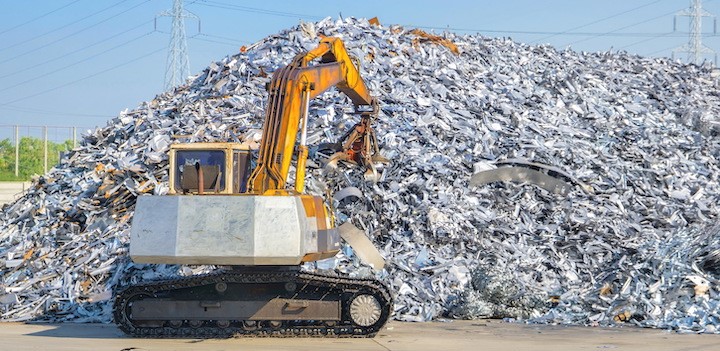Councils could face a collective bill of more than £1bn by 2036 under current government proposals to tax the carbon emitted from burning waste, industry organisations have warned.
Taxing councils in this way would be a “bombshell for the delicately-balanced funding of local waste services”, the Local Government Association (LGA), County Council Network (CCN) and District Councils Network (DCN) said.
The organisations have responded to a government consultation on the Emissions Trading Scheme (ETS), a system that puts a market price on carbon emissions, arguing that the costs should be put on industry rather than councils.
The ETS currently applies to the aviation industry, and the last government proposed to expand it to the incineration of waste from 2028.
But new analysis conducted by the LGA, CCN and DCN shows that the proposals could cost councils as much as £747m in 2028 and potentially rise to £1.1bn in 2036, with a total cumulative cost over this period of £6.5bn.
The LGA, CCN and DCN have said that manufacturers should pick up the bill, calling on the government to ensure the costs are passed on to the industries creating fossil-based material in the first place – such as is found in packaging, textiles, electricals and furniture.
Councils have no powers to reduce the amount of fossil-based material put on the market, they said, and no “meaningful levers” to reduce the levels of fossil-based waste sent for incineration.
Additionally, by placing this cost on industry, the government will incentivise producers to reduce the level of fossil-based material created in the first place while also raising funding to reinvest in solutions such as carbon capture and storage technologies, they argued.
Although there are plans to transfer costs for packaging waste onto producers, the new analysis suggests this would cover only 19% of costs while there are no plans to do the same for the vast majority of waste that is sent for incineration.
Adam Hug, environment spokesperson for the LGA said: “Councils support the principle of this scheme’s objective to incentivise a reduction in carbon emissions from waste incineration and to encourage recycling efforts, but to succeed it must put the right incentives in the right places.
“Current proposals risk councils and local taxpayers facing enormous costs, which simultaneously risks the scheme failing to meet its objectives while exposing councils to significant additional financial risk. Councils are also increasingly ensuring that energy is generated from the incineration process supporting both the grid and electric vehicle fleets.
“We urge government to review proposals, to hold industry responsible for reducing the level of waste it creates in the first place, alongside wider support for councils in their efforts to increase recycling.”
Andy Graham, DCN environment spokesperson, commented: “Taxing councils for the waste we have little option but to incinerate would be a bombshell for the delicately-balanced funding of local waste services – including district councils’ successful efforts to increase recycling.
“District councils spend over 40% more on waste collection than we did four years ago as we battle to retain staff and implement stringent national guidance on how we collect waste. We cannot afford to be hit by an incineration tax.
“We want to make it easier for our citizens to recycle materials like clothing and medical waste so it doesn’t need to be incinerated. We can only do this through action from producers, who should be incentivised to produce recyclable goods and penalised if they don’t.”
Richard Clewer, infrastructure and planning spokesperson for the County Councils Network, said: “Councils support the principle of reducing fossil-based materials, but this proposed carbon tax is in the wrong place: we should employ the polluter pays principle instead. It must be down to the producers of fossil-based materials to pay these costs to incentivise them to use greener methods, rather than local authorities who have no choice but to incinerate this waste long after it is produced and purchased.
“As this research shows, these proposals will result in significant extra costs for local authorities. If these costs are to be borne by councils, they will have to paid for by council tax or by reducing highly-valued services so we are calling on the new government to rethink these proposals.”
—————
FREE bi-weekly newsletters
Subscribe to Room151 Newsletters
Follow us on LinkedIn
Follow us here
Monthly Online Treasury Briefing
Sign up here with a .gov.uk email address
Room151 Webinars
Visit the Room151 channel














